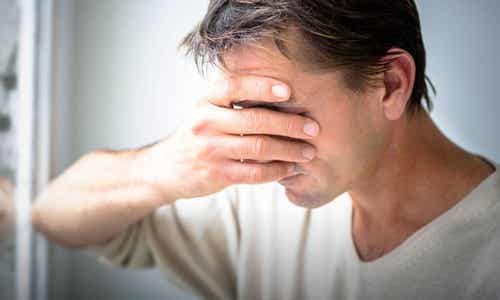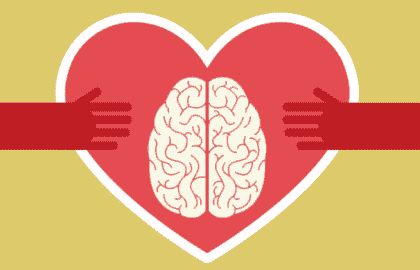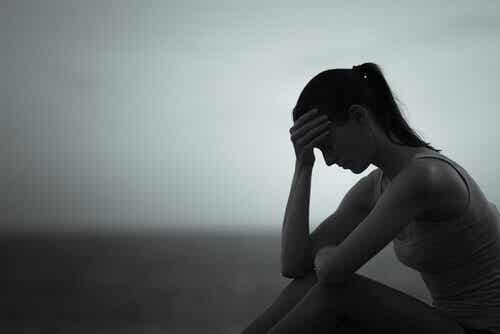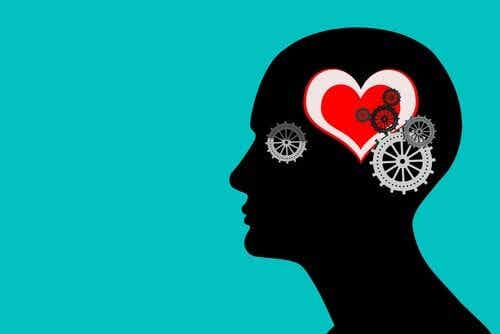Emotions also cause physical pain, especially when we are worried, we feel disappointed, pervaded by anxiety. What is the cause of this phenomenon?

Written and verified by the psychologist GetPersonalGrowth.
Last update: 15 November 2021
Emotions and physical pain have an almost direct connection that many of us have experienced firsthand on more than one occasion. That problem at work that sometimes turns into discomfort and heartburn. An argument with the partner that results in a headache. The worry that arises from an activity that we have postponed for a long time and that turns into back pain or cramps.
We could also talk about another phenomenon, namely the broken heart syndrome. When we experience the end of a love, we feel abandoned or betrayed, the emotional suffering is immense and even devastating. And the body also suffers.
Tiredness, frustration, exhaustion and even numbness of muscles and joints arise. Why does this happen? How is it possible for the body to hurt up to this point in the presence of great worries or when they break our hearts? You are about to find out.
How are emotions and physical pain related?
For a few decades already psychology and medicine have shown a profound correlation between emotional pain and physical pain. This phenomenon, which has been given the name of "somatization", shows us the union between mind and body, an aspect that in the past centuries had been questioned by the classic Cartesian model.
Not surprisingly, many doctors are well aware that a diagnosis of depression tends to coincide with the onset of headache, muscle pain, digestive disturbances, and even exacerbation of chronic pain. In addition to this, neurobiological research indicates that a large part of the manifestations of physical pain are associated with emotional stress.
The study conducted by Duke University, in North Carolina (USA), tells us that it is necessary take psychological and emotional factors into account when making a diagnosis. It could be, for example, that the stomach ache is not due to an ulcer but rather an anxiety disorder.
Sadness and anger, the emotions with the greatest impact on the body
Dr. Afton Hassett is a scientist and researcher at the Chronic Pain and Fatigue Research Center of the University of Michigan (USA). This expert highlights that the wide range of emotions (positive and negative) experienced by the human being have a certain impact on the body.
This imprint can be advantageous or disadvantageous. Sadness and anger are the least pleasant emotions for the body. For example, childhood abuse, the abandonment of a parent, a bereavement or a complicated love relationship are all experiences that leave marks on the body. Among these, the most common is back pain.
In this link between emotions and physical pain it is important to emphasize the role of anger. Dr. Hassett explains that people who are particularly short-tempered or who have kept their feelings and discomfort repressed tend to show hypersensitivity to pain over time. They generally suffer from stomach pain, migraine, joint pain.
Emotions and physical pain: which of the two is more intense?
What hurts the most, the loss of a loved one or a fractured bone? Our partner leaving us or a burn on the skin? As paradoxical as these aspects may seem, the answer seems to leave no room for misunderstandings: emotional pain hurts more than physical pain.
This is what is supported by a study published in the journal Psychological Science and conducted by doctors Adrienne Carter-Sowell, Zhanheng Chen. The key points for understanding this association between emotions and physical pain are the following:
- Emotional suffering in many cases is prolonged over time. While physical pain is momentary, emotional pain can last for years, even a lifetime.
- We are not good at dealing with negative emotions. Failure to mourn over a loss or breakup can make this suffering chronic. The same is true of the anger we have talked about. If we hid our frustrations and anger about certain facts or circumstances for years, that anger would end up leaving marks on our bodies.
- On the other hand, the authors of the study highlight an interesting aspect. Physical pain cannot be experienced the same way, while we tend to trigger emotional pain several times. This means that we cannot have an identical perception of the repeated fracture of a bone, but we can relive the suffering of a past event.
Concluding remarks
Emotions and physical pain are two sides of the same coin. We often experience them: that pain in the chest, those cramps, that sore neck, that throbbing pain in the temples… What can we do in these cases? The answer is simple, but difficult to apply: we must get used to managing emotions. Let us not postpone what worries us and what hurts us today until tomorrow.
An argument that ended badly, badly managed stress, a worry that we do not resolve, a painful breakup that does not allow us to move on ... All of this has consequences that go far beyond the mind.
Let's keep this in mind: if we can't deal with emotional pain alone, we can always turn to a good professional.


























